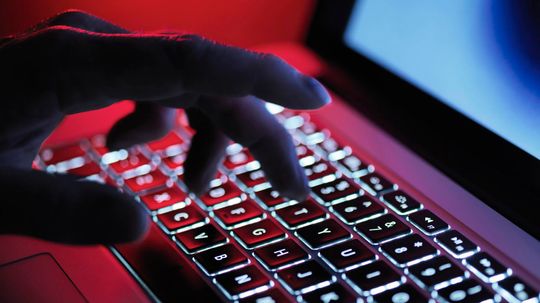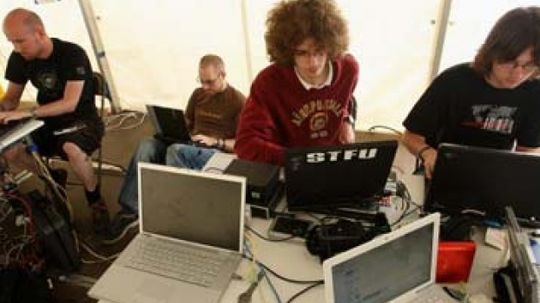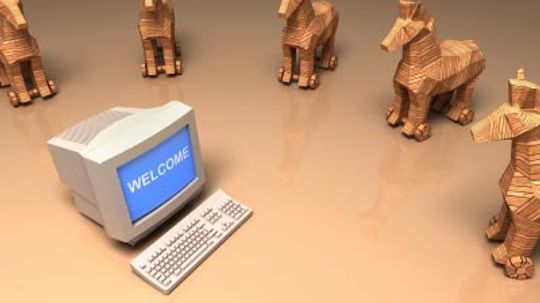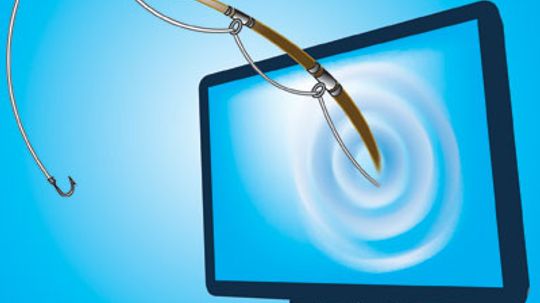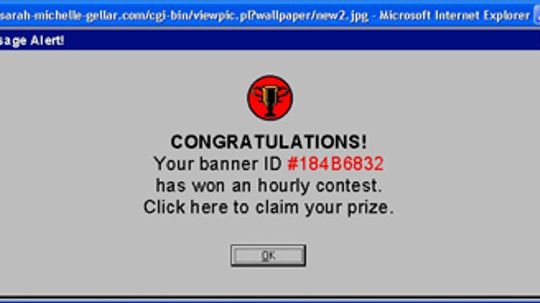Computer & Internet Security
Computer surveillance and security covers a wide range of ways to keep you and your information safe. Learn about firewalls, zombie computers, hackers and workplace surveillance.
Learn More / Page 2
Remember that crazy video you made with your friends years ago? Yes, you do, but you also wish it wasn't the first thing that pops up in a Google search of your name. Well, rejoice! There's a way to get it out of Google.
By Beth Brindle
Do you know what you're doing when you're "dropping dox" on somebody? It's called "doxxing," and while it's technically not illegal, it's probably not a very nice thing to do to someone.
By Beth Brindle
You've probably heard of the hacktivist group known as Anonymous, but do you really know what motivates the group's actions or how members organize their initiatives?
Advertisement
The entertainment industry has tried to stop people from making digital copies of its work, but in 2011, they enlisted the help of the U.S. government. What is the Stop Online Piracy Act and what would it achieve?
Tracking copyrighted files online is a tricky business, but cutting-edge software has learned to recognize data unique to music and movie clips. You're also leaving digital traces of yourself all over the internet. How are these two things related?
No one should think of surfing the Internet without some kind of anti-virus software protection. Learn if there is any free anti-virus software in this article.
Millions of people around the world have personal profiles on social networking sites. But when those people pass away, what happens to all that personal information they put online?
Advertisement
What does it take to cripple a nation? Someone with solid computer skills, for a start. Nefarious hackers wield a lot of power with a few keystrokes, and the United States is taking action.
We all get spam e-mail messages that tell us to follow a link. But that link could download a Trojan horse. What is it, and how is it different from a virus?
By John Fuller
Sometimes it seems like no matter what internet community you join, someone's trying to drive you crazy. Are they just annoying or are they trolling?
Hackers can disable digital infrastructure in minutes. Is it only a matter of time before countries attack one another's computers? Or have they already started?
Advertisement
Most computer-savvy people know about viruses and how to prevent an infection. But what are some of the most destructive viruses of all time, the record-smasher server-crashers?
People traveling to the United States have grown accustomed to tight security. But can the government really take your laptop and keep it indefinitely?
Could your e-mail be used against you in a court of law? Maybe. Computer forensics searches, preserves and analyzes information on computer systems for potential evidence in a trial.
Internet censors range from parents and employers to national governments. They block access to the Web pages they identify as undesirable.
Advertisement
E-mail scams are often well-disguised and can be very dangerous. Check out some examples of e-mail scams in this article.
By Tim Crosby
Without hackers, we'd have no PCs or iPods. Yet, hackers have gotten a bad reputation as criminals of the computer age. Are they friends or foes?
As the famous cartoon has it, "On the internet, nobody knows you're a dog." Online fraud is one of the fastest-growing crimes -- so how can you protect yourself?
By Joe Wallace
With the evolution of the internet, the big kid in class who used to steal your lunch money now hacks your e-mail, sends you threatening messages, and sabotages your computer. If you're wondering how to stop cyberbullying, read on!
Advertisement
When hackers take over computers to do their Internet bidding, they create zombie computers. Allegedly, one hacker under investigation used a single computer to control a network of more than 1.5 million zombie computers.
In "Live Free or Die Hard," Detective John McLane fights a group that carries out attacks using the Internet. Is it really possible for hackers to cause economic or physical devastation in the United States?
How did hackers exploit four different "zero day" flaws in Microsoft Word? Find out what went wrong with Microsoft Word.
By Julia Layton
Logic bombs can cripple a company's computer system and either reveal or destroy sensitive information. It's often a tool used by angry employees -- in the IT world, it has a reputation of being associated with "disgruntled employee syndrome."
By Julia Layton
Advertisement
Most people associate phishing with e-mail messages imitating banks or other businesses in an attempt to scam victims into revealing personal information. But e-mail messages are only one small piece of a phishing scam.
According to recent estimates, more than two-thirds of all PCs are infected with some kind of spyware. These programs track your Web habits and more. Is your computer doomed, or can you get rid of spyware?
By Dave Coustan

